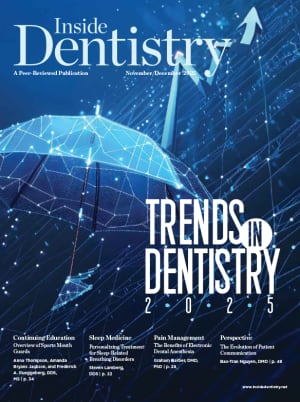Kansas City University (KCU) unveiled the nation's newest and most innovative College of Dental Medicine (CDM) in a ribbon-cutting ceremony at the Harry M. Cornell Center for Dental Education on its McIntire-Farber Campus in Joplin, Missouri on Monday, June 26, 2023.
The Harry M. Cornell Dental Education Center is a $65 million state-of-the-art facility designed to address the growing shortage of dentists, especially in the four-state region that includes southwest Missouri, southeast Kansas, northwest Arkansas and northeast Oklahoma.
"We know poor oral health leads to poor overall health," said Marc B. Hahn, DO, president and CEO of KCU. "In fact, poor oral health has been found to promote a host of other illnesses, including cardiovascular disease, diabetes, and even Alzheimer's. KCU is proud to lead an effort to erase disparities in oral health care and improve health outcomes for people in rural areas."
The inaugural class of 80 students will be seated on July 31, 2023. Students will learn the science of dental medicine using the latest technology with simulated patients, virtual reality, 3-D printing, intra- oral camera and digital scanning of teeth.
The novel curriculum will place special emphasis on integrating basic sciences with clinical knowledge so dental students are prepared sooner to provide dental care to patients. Integrating dental medicine coursework with KCU's College of Osteopathic Medicine will lead future dentists to recognize how oral health problems can impact a patient's overall health, as well as promote interprofessional education in both colleges.
"The KCU College of Dental Medicine will integrate dental and medical education so that our students will be treating the whole patient," Linda Niessen, DMD, MPH, MPP founding dean of the College of Dental Medicine. "We envision that the KCU College of Dental Medicine will become a center of excellence in the region improving oral health and increasing access to needed oral health care."
In addition to state-of-the-art educational labs, the CDM will house an Oral Health Center where students will experience hands-on learning by providing dental services to patients under the supervision of dental faculty. CDM faculty will soon begin offering care to patients who lack access to oral health care. "Students will be treating patients in their second year of study," said Niessen. "Faculty members share a strong desire to serve our community right away and will soon see individuals who have had difficulty obtaining needed dental care through referrals with local nonprofit agencies."
Diverse Student Body
KCU's inaugural cohort of dental students, the Class of 2027, represents a diverse population with a wide range in age, background and ethnicity. Nearly 50 percent of the students come from Missouri, Kansas, Arkansas and Oklahoma. Others from rural Alabama, Georgia, Michigan and Native American tribes. Some followed a traditional path to dental school and will begin their studies directly after earning an undergraduate degree. Others bring workforce experience as dental hygienists and other areas of health science; still others are answering the call to health care after working in other fields.
Planning for the CDM began before and continued through the COVID-19 pandemic. Focusing on key take-aways from the pandemic, KCU redesigned the original architectural plans in order to improve airflow, modify the dental operatories, and mitigate the spread of viruses and bacteria throughout the building. Additionally, the Harry M. Cornell Dental Education Center and Center for Oral Health were built with sustainability in mind using local products, contractors and native landscaping.
Meeting the Need
As the country grapples with the need to correct health inequities that were made worse by the pandemic, the reality of the nation's oral health crisis is becoming clear. The U.S. requires 7,000 new dentists to fill shortages nationwide. Many practicing dentists are nearing retirement or left the field. Estimates are that it will take another 8,600 new dentists each year to maintain a national supply.
The Joplin region, like many rural areas in the United States, suffers from a shortage of dentists. Nearly all counties within a 10-100-mile radius of Joplin qualify as Dental Health Professional Shortage Areas (DHPSAs) by the U.S. Health Resources and Services Administration (HRSA). It is estimated that Missouri alone has a shortage of more than 700 dentists, Oklahoma requires 166 more dentists, and both Arkansas and Kansas need more than 100 to address these shortages.
Kansas City University is committed to meeting the health care needs of the region. This new dental school will support the university's mission of improving the well-being of the communities we serve. The project represents an investment of more than $100 million, with capital expenditures in excess of $65 million. Philanthropy has played a major role in this project with nearly $45 million raised from individual donors and foundations.
KCU will continue to secure funding for ongoing scholarships to offset the high cost of dental education and ensure the education of much-needed dentists to meet local and national oral health-care needs.
About Kansas City University
Kansas City University, founded in 1916, is a fully accredited, private not-for-profit health sciences university with Colleges of Osteopathic Medicine, Biosciences and the College of Dental Medicine. The University offers multiple graduate degrees: a doctor of osteopathic medicine; a doctorate in clinical psychology; a master of arts in bioethics; a master of science in biomedical sciences; a master of business administration in partnership with Rockhurst University; a master of public health in partnership with the University of Nebraska Medical Center; and the new doctor of dental medicine. The medical school is the sixth largest, the ninth most impactful in primary care and the tenth most affordable of private medical colleges in the nation. It is also the leading producer of physicians for the state of Missouri.
KCU has two campuses in Kansas City and Joplin, Missouri, to address the growing population health needs of both urban and rural communities in the region.
Kansas City University Opens College of Dental Medicine to Address Oral Health Crisis
June 29, 2023
